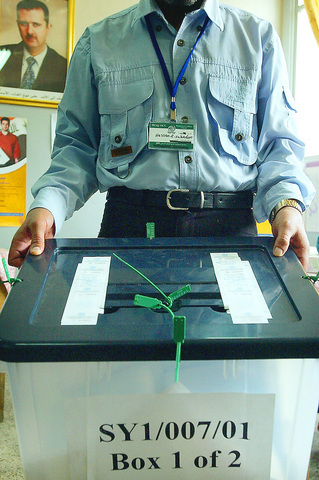Among the many ways that security concerns affected Iraq's elections on Sunday, one of the most controversial was that foreign observers played almost no direct role in monitoring the balloting.
Instead, thousands of hastily trained Iraqis fanned out to polling places to observe the vote, while a small team of 129 foreign observers worked only within the heavily guarded Green Zone in central Baghdad.
That decision, largely made in December because of heavy attacks aimed at disrupting the election, broke with increasingly observed election practice in conflict zones, where international officials have played crucial roles in resolving conflicts.

PHOTO: AP
Still, after the close of balloting on Sunday, a group of electoral officials from 11 nations who were brought in to provide independent oversight gave their seal of approval to the process, and they commended the Iraqis' work.
The oversight group, the International Mission for Iraqi Elections, said that primary monitoring of polling places was provided by more than 50,000 Iraqis who had been trained by groups like the National Democratic Institute and the EU's Election Support Project.
For some areas within the Green Zone, 129 foreign observers did monitor the polling.
The chairman of the election group's steering committee, Jean-Pierre Kingsley, who is Canada's chief electoral officer, stressed that Iraqi parties who had complaints would be heard by his group and had further avenues for appeal if they were still unsatisfied.
As of Sunday, no such complaints had been reported. With the counting process in full swing, there was little official assessment abroad of the elections' fairness.
But Carlos Valenzuela, the UN's electoral adviser in Iraq, said he was encouraged by early indications and added that he would feel "elated" if the results yielded so far were confirmed, Reuters reported.
Kingley's group recommended further improvements in upcoming elections, including greater transparency in financial contributions and expenditures, improvements to the voter registration process, and a review of the criteria for candidate eligibility.
With corruption rife and political intrigue abounding in the country, even Iraqi election officials have admitted their discomfort in relying solely on indigenous observers.
"Hopefully it's the last time anyone will try that," admitted one high-level election official.
In part, foreign observers provide legitimacy to local observers, while also providing weight once problems do arise.
In Afghanistan, for example, when some candidates contested the elections when the indelible ink meant to prevent voters from double voting appeared to rub off, foreign observers were critical to diffusing the potential standoff.
In Ukraine, too, says Domenico Tuccinardi, who led training of some of the Iraqi observers, foreign observers were critical to helping raise doubts about an initial election.
Without that extra help in polling place monitoring, Kingsley said, guiding early parts of the process proved critical, including registration and voter outreach.
Ultimately, he said, registration for the election went better than expected, thanks in large part to Tuccinardi's suggestion of using the rolls for Iraq's food rationing system as a sort of makeshift census to guide the effort.

‘TERRORIST ATTACK’: The convoy of Brigadier General Hamdi Shukri resulted in the ‘martyrdom of five of our armed forces,’ the Presidential Leadership Council said A blast targeting the convoy of a Saudi Arabian-backed armed group killed five in Yemen’s southern city of Aden and injured the commander of the government-allied unit, officials said on Wednesday. “The treacherous terrorist attack targeting the convoy of Brigadier General Hamdi Shukri, commander of the Second Giants Brigade, resulted in the martyrdom of five of our armed forces heroes and the injury of three others,” Yemen’s Saudi Arabia-backed Presidential Leadership Council said in a statement published by Yemeni news agency Saba. A security source told reporters that a car bomb on the side of the road in the Ja’awla area in

‘SHOCK TACTIC’: The dismissal of Yang mirrors past cases such as Jang Song-thaek, Kim’s uncle, who was executed after being accused of plotting to overthrow his nephew North Korean leader Kim Jong-un has fired his vice premier, compared him to a goat and railed against “incompetent” officials, state media reported yesterday, in a rare and very public broadside against apparatchiks at the opening of a critical factory. Vice Premier Yang Sung-ho was sacked “on the spot,” the state-run Korean Central News Agency said, in a speech in which Kim attacked “irresponsible, rude and incompetent leading officials.” “Please, comrade vice premier, resign by yourself when you can do it on your own before it is too late,” Kim reportedly said. “He is ineligible for an important duty. Put simply, it was

SCAM CLAMPDOWN: About 130 South Korean scam suspects have been sent home since October last year, and 60 more are still waiting for repatriation Dozens of South Koreans allegedly involved in online scams in Cambodia were yesterday returned to South Korea to face investigations in what was the largest group repatriation of Korean criminal suspects from abroad. The 73 South Korean suspects allegedly scammed fellow Koreans out of 48.6 billion won (US$33 million), South Korea said. Upon arrival in South Korea’s Incheon International Airport aboard a chartered plane, the suspects — 65 men and eight women — were sent to police stations. Local TV footage showed the suspects, in handcuffs and wearing masks, being escorted by police officers and boarding buses. They were among about 260 South

A former flight attendant for a Canadian airline posed as a commercial pilot and as a current flight attendant to obtain hundreds of free flights from US airlines, authorities said on Tuesday. Dallas Pokornik, 33, of Toronto, was arrested in Panama after being indicted on wire fraud charges in US federal court in Hawaii in October last year. He pleaded not guilty on Tuesday following his extradition to the US. Pokornik was a flight attendant for a Toronto-based airline from 2017 to 2019, then used fake employee identification from that carrier to obtain tickets reserved for pilots and flight attendants on three other